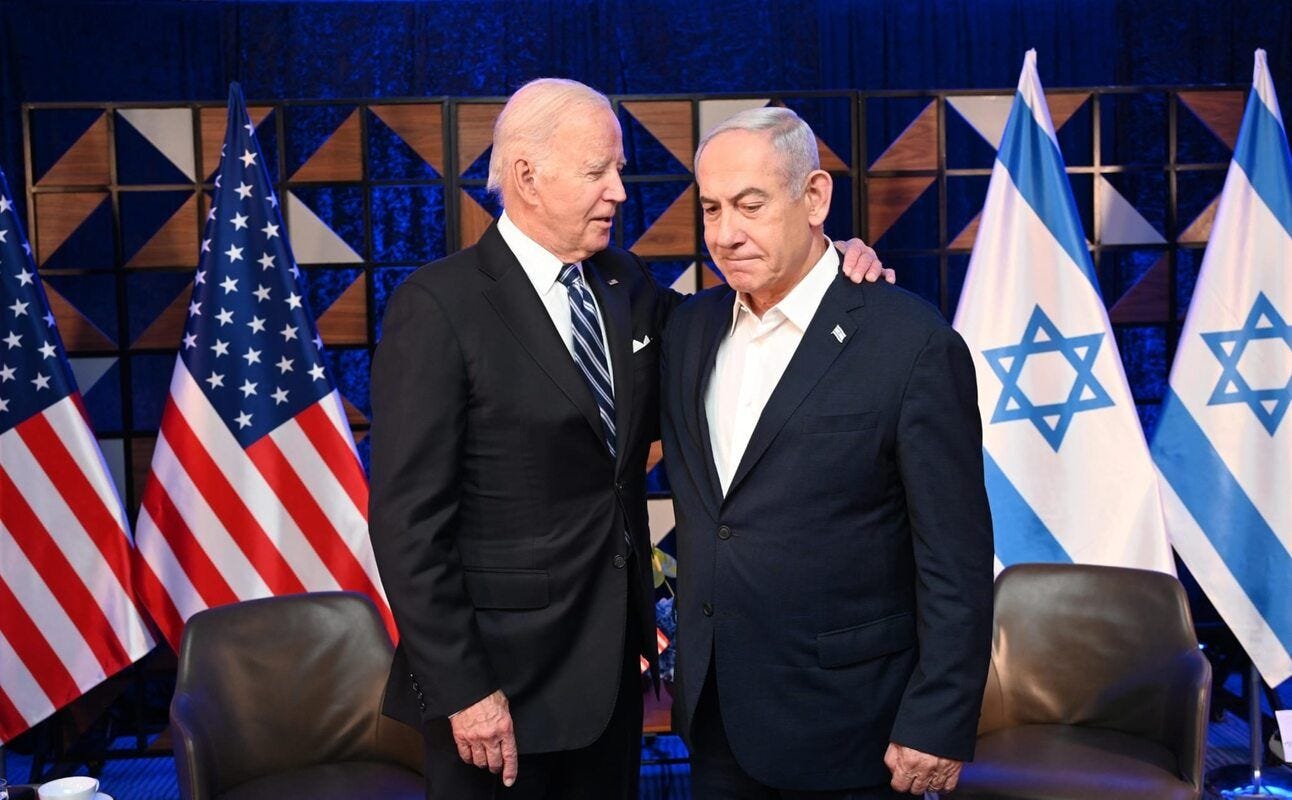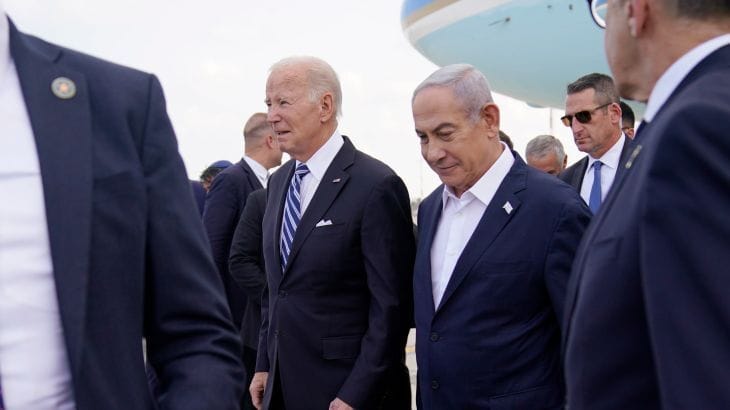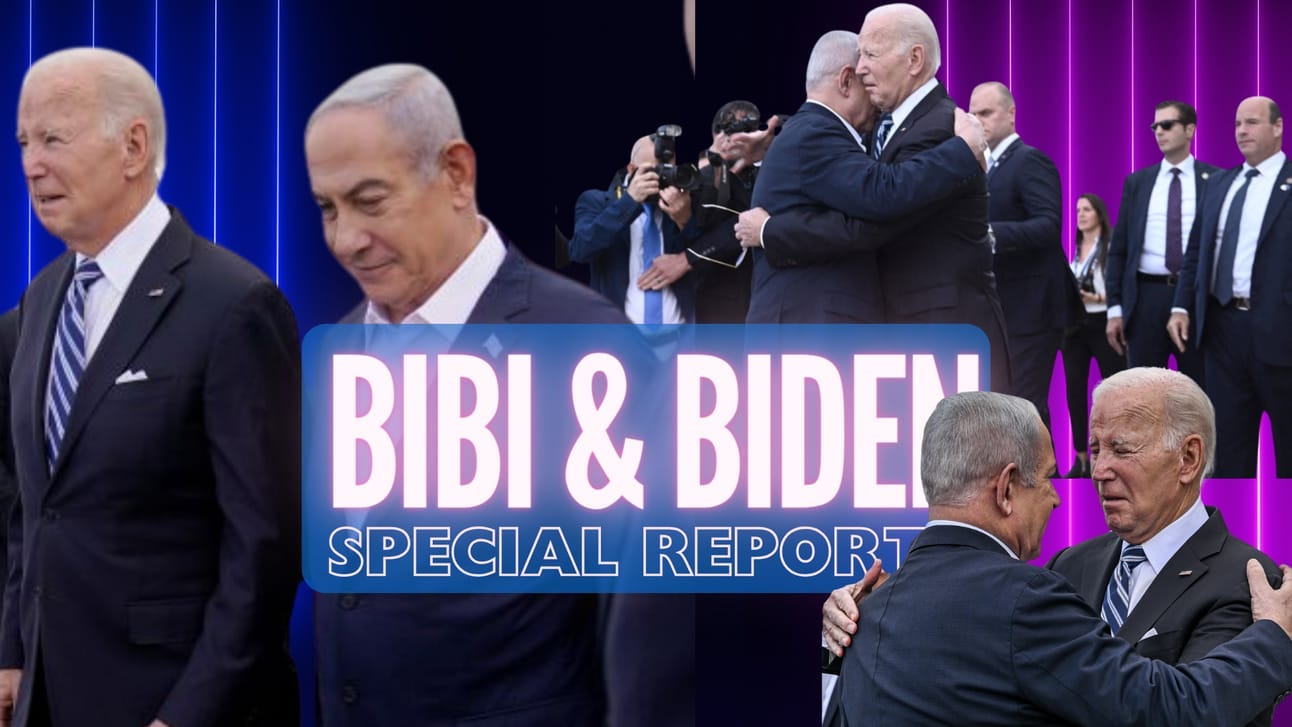- The Narativ with Zev Shalev
- Posts
- Biden and Netanyahu: The Complexities of a Decades-Long 'Frenemy' Relationship
Biden and Netanyahu: The Complexities of a Decades-Long 'Frenemy' Relationship
As the US Ceasefire Plan Appears to Collapse, the Bond Between the U.S. President and Israeli Prime Minister Faces Its Toughest Test Yet, With Global Implications and Election Interference at Play.

The relationship between U.S. President Joe Biden and Israeli Prime Minister Benjamin Netanyahu is as complex as it is long. The two leaders' friendship has been shaped by nearly four decades on the world stage together and has undoubtedly left an indelible mark on the world. Now, the War in Gaza is bringing their relationship into sharp focus.
From their early days as young senators and fledgling diplomats, their paths have intertwined through the corridors of power of their respective nations. Together, they have navigated the turbulent waters of Middle East crises and East-West superpower relations, forging a unique and complex bond best described as "frenemies."
Despite a foundation of mutual respect and personal rapport, Biden and Bibi's dynamic has been repeatedly strained by sharp disagreements on key issues such as settlement expansion, the Iran nuclear deal, and the humanitarian crisis in Gaza. These challenges, which have tested the strength of their relationship, are a testament to the complexity of their dynamic.
Netanyahu's Pranksterism
In 2010, then-Vice President Joe Biden traveled to Israel to advance the peace process. Upon his arrival, he was surprised by the Netanyahu government's announcement to build 1,600 new settlements in East Jerusalem. Biden viewed the announcement as a diplomatic affront, and because he was in the West Bank when the news broke, his entire schedule was thrown into disarray.
Bibi knew his surprise announcement would ensnare Biden's motorcade in Israel's notorious rush-hour traffic. More crucially, he knew it would delay Biden's arrival at a state dinner, limiting the VP's bonding time with Bibi's political opponents, a key priority for that visit to Israel.
This pranksterism exemplifies Netanyahu's foreign policy approach toward the US. We have seen it repeatedly in the last few months as Biden and Secretary of State Antony Blinken have attempted to broker a ceasefire, which Netanyahu or Hamas has scuttled at every turn.

Friends or…
Recent Developments
September 20, 2023: Biden and Netanyahu met in New York to discuss Iran's nuclear ambitions, regional security, and the importance of upholding democratic values in Israel. The meeting was held at a hotel rather than the White House, symbolizing U.S. displeasure with some of Netanyahu's policies.
October 18, 2023: Biden visited Israel to show solidarity amidst the conflict with Hamas. The visit included discussions on humanitarian aid for Gaza and efforts to prevent a major ground operation in Rafah. This visit was overshadowed by a deadly explosion at a Gaza hospital, which added to the diplomatic complexities.
March 18, 2024: Biden and Netanyahu discussed ongoing hostage negotiations and the humanitarian crisis in Gaza. Biden stressed the need for increased aid and the importance of protecting civilians while defeating Hamas.
April 5, 2024: Biden and Netanyahu had another call about the situation in Gaza. Biden urged Netanyahu to empower his negotiators to conclude a deal without delay.
May 31, 2024: Biden publicly endorses a 3-phase peace plan from the Israeli government, which Netanyahu immediately denies knowing about.
June 12, 2024: Secretary of State Antony Blinken says Hamas demands further changes to the ceasefire proposal. “The time for a decision is now,“ he said

Frenemies?
The Trump Factor
The Bibi-Biden bromance has entered a frenemy zone, with Netanyahu seemingly more invested in thwarting Biden's peace attempts than in finding a resolution to the Gaza crisis. While some suspect Bibi is motivated by self-preservation, his actions may have more to do with his ally, Donald Trump.
The State Department quietly leaked that if a ceasefire deal could not be reached between Hamas and Israel, the US would attempt to strike a unilateral deal for the release of 8 remaining US hostages held captive by Hamas.
The 8 Americans pose a political threat to Biden's re-election chances. If they are not released from captivity by the elections, the GOP will use the crisis to criticize Biden.
Gershkovich and Putin
Meanwhile, Donald Trump has signaled he is negotiating the release of US journalist Evan Gershkovich, who is currently under arrest in Russia. It's unclear if Trump is negotiating directly with Russian President Vladimir Putin, but any backchannel talks involving US hostages would be damaging to US interests.
Crucially, Putin has repeatedly hosted the Hamas leadership and advised them since the October 7th attack on Israel.
The safe return of the American hostages to their homes is a key Biden priority, and any attempt by Trump to insert himself into those negotiations during this election cycle can only be viewed as Putin's attempt to interfere in the US elections. Like Trump, Bibi Netanyahu is aligned with Putin.
Election Interference
The fact that Trump is leveraging his connections with Putin to gain political points, even just on Gershkovich, is deeply concerning. It suggests that under a Trump presidency, the United States could find itself beholden to Russia's whims, compromising our national security and global standing.
Any intervention by Trump in the Gaza conflict or regarding Gershkovich would be highly detrimental to the administration's progress, puts US lives at risk, and needs to be broadly criticized.
The Future at Stake
In this critical moment, we need to elect a leader who will prioritize diplomacy, human rights, the rule of law, and democratic values and is beholden to the American people, not foreign benefactors. The future of our nation, and indeed the world, may rest on it

Watch the SPECIAL REPORT ON NARATIV LIVE at 9 PM ET on X.
Watch the SPECIAL REPORT ON NARATIV LIVE at 9 PM ET on X.
Reply